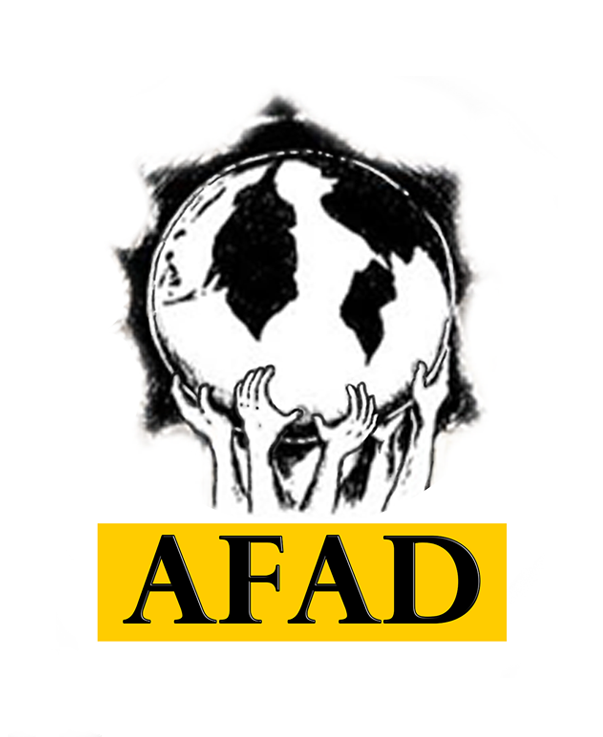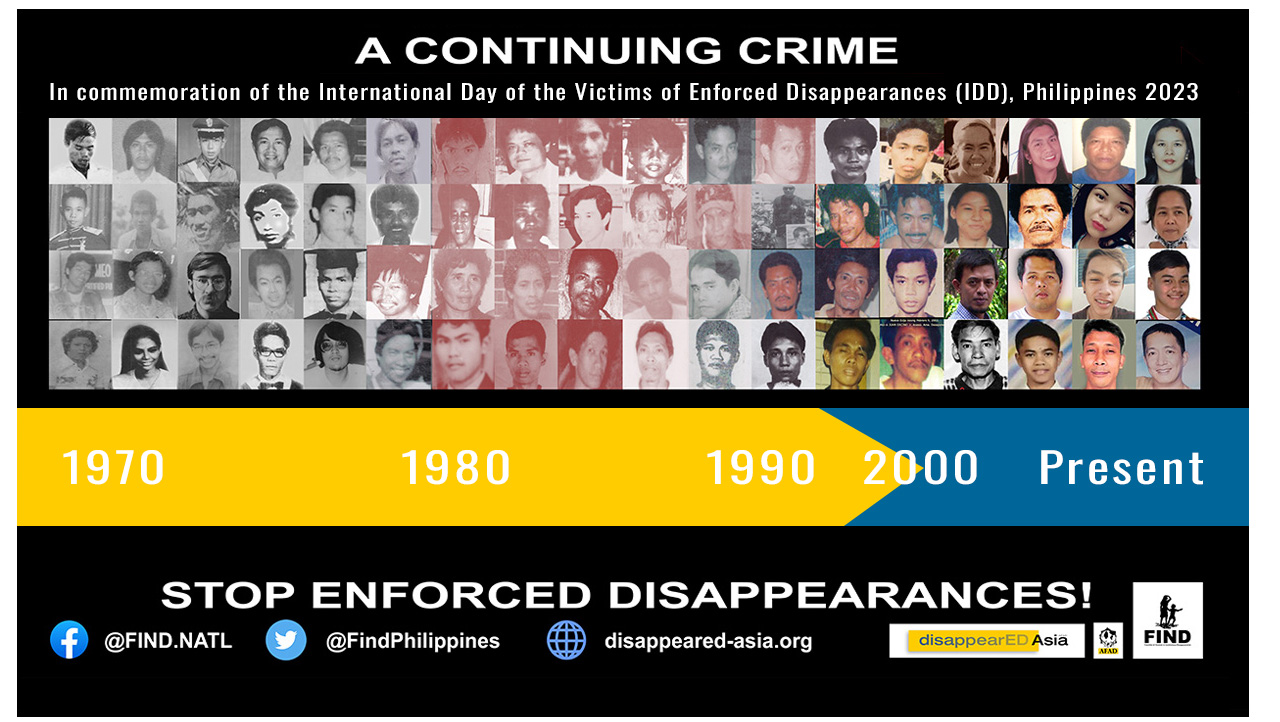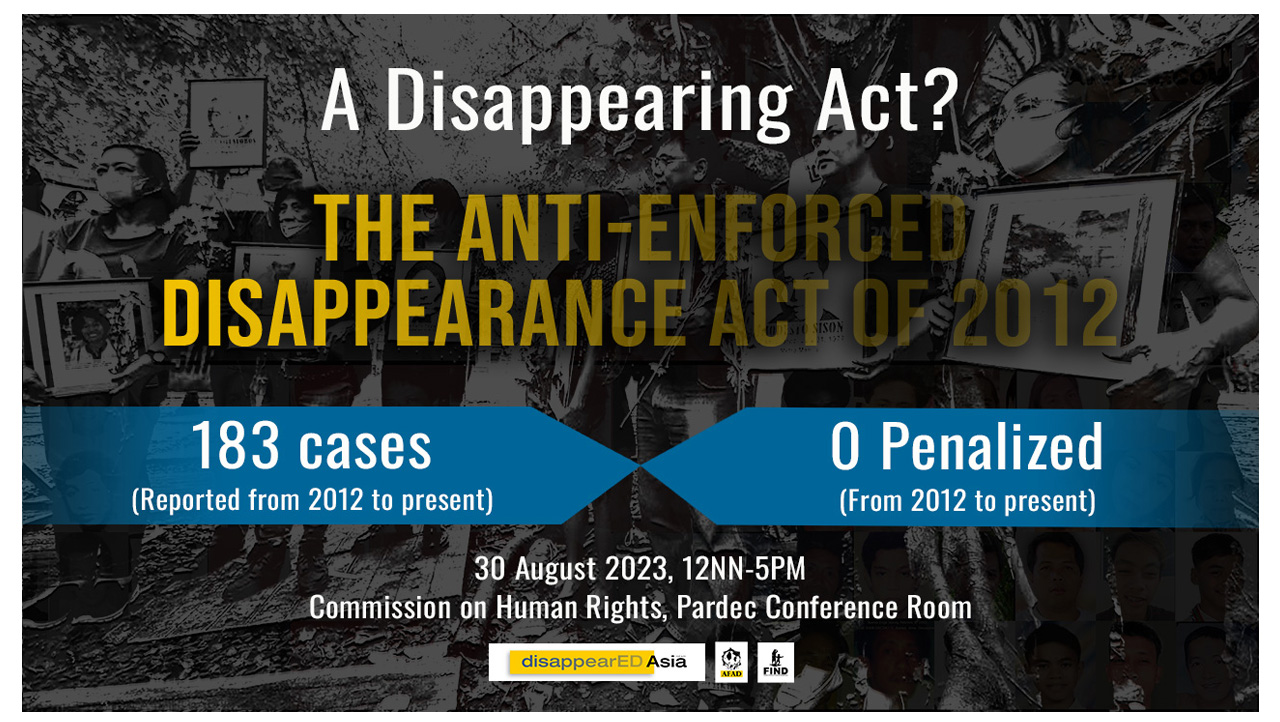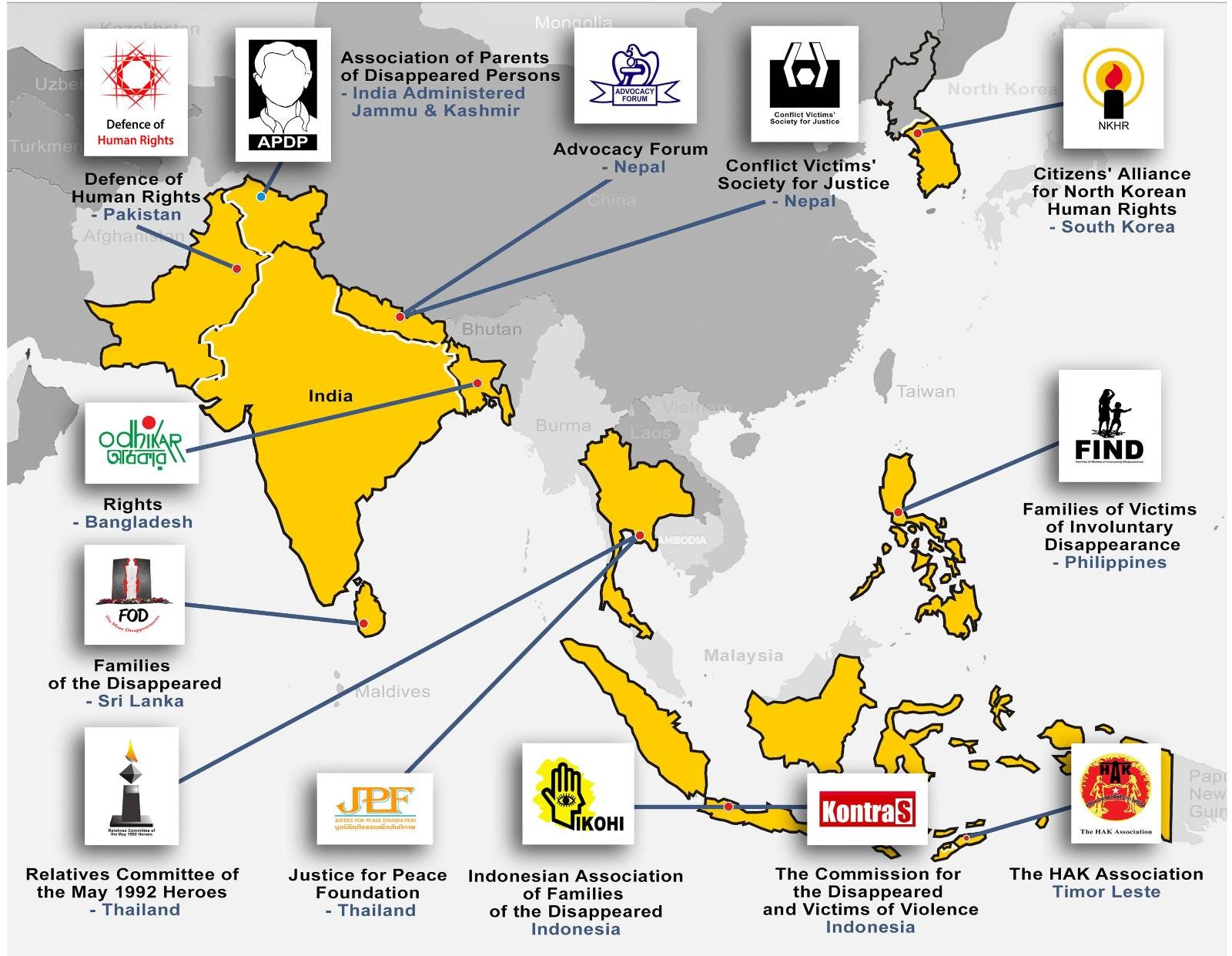To the attention of the United Nations Working Group on Enforced or Involuntary Disappearances (UN WGEID)
On the occasion of its 106th Session
OBJECTIVE
The Asian Federation Against Enforced Disappearances (AFAD) wishes to express its deepest concern about human rights violations in the Lao People’s Democratic Republic (Laos PDR) and would like to draw the attention of the Working Group to the alarming situation of enforced disappearances, which constitutes an obstacle to the implementation of the 1992 Declaration.
Distinguished Members of the United Nations Working Group on Enforced or Involuntary Disappearances,
Laos is a signatory to the main international human rights instruments[1] including the Convention for the Protection of All Persons from Enforced Disappearance (ICPED); yet, the practice of enforced disappearances in the Lao PDR is alarming.
Indeed, Laos can be described as an authoritarian one-party State: Lao People's Revolutionary Party (LPRP) is the only party recognized by the 1991 Constitution. Powers are concentrated in the hands of the executive: the National Assembly merely approves laws that were already vetted by the executive; it can virtually override any decisions made by the judiciary or other institutions. Generally, the Lao PDR tends to make use of a reference to “national stability” to justify a shrinkage of the room that is left for democracy. Transparency International ranked Laos 145 out of 175 countries at the last corruption perception index[2]. Laos has recently passed a decree restricting freedom of speech, rendering online criticism of the Government illegal[3]. On the occasion of the last Universal Periodic Review, several delegations have expressed concern over the shrinking space for civil society and freedom of expression[4].
The International Federation for Human Rights had already expressed concern over arbitrary arrests and enforced disappearances in 2012[5]. From 1980 to May 2014, there are eight cases of enforced disappearance in Lao People’s Democratic Republic. Four people were imprisoned, “one died of heat exhaustion in prison and one case was discontinued. There are currently two outstanding cases that are pending before the WGEID - Ms. Kingkeo Phongsely (2009) and Mr. Sombath Somphone (2012)”[6]. To this date, information provided by the Lao PDR is still not considered sufficient to lead to clarification of these two cases.
As you are well aware of, Mr. Sombath Somphone was disappeared in Vientiane on December 15, 2012. Mr. Somphone is arguably the most prominent case of enforced disappearance in the Lao PDR. Mr. Somphone is a well-known development worker in Laos; he is also a scientist, and a scholar. His life’s work focuses on poverty reduction and sustainability; he developed different government-approved initiatives that helped farmers achieve food security. He has always been supportive of the Lao Government’s social development agenda, especially the agenda of poverty alleviation and improvement of rural livelihoods. In 2005, he received the prestigious 2005 Magsaysay Award for Community leadership, also known as the “Asian Nobel Prize”. Police security footage has showed him being stopped at a police checkpoint and taken into custody. He has not been seen since then. On July 7, 2013, his spouse, Mrs. Ng Shui Meng, filed a report to the WGEID; the WGEID subsequently accepted the case on July 28, 2013.
On the occasion of the last Universal Periodic Review, twenty delegations made reference to enforced disappearances in Laos and/or urged Laos to ratify the ICPPED; ten of them referred specifically to Mr. Sombath Somphone[7]. Many International Non-Governmental Organisations and Human Rights organisations have pointed out the failure by the Government to conduct a thorough, credible and impartial investigation. Furthermore, Amnesty International highlighted the “Lao government’s failure to remedy a serious human rights violation and persistence in ignoring its international human rights obligations.”[8].
Both the Lao PDR Constitution and the International Covenant on Civil and Political Rights (ICCPR), to which Laos is party to, protect the right to freedom of expression, association and peaceful assembly. However, the Lao authorities continue to restrict these freedoms. The 2009 Decree on Associations provides for certain restrictions, one of them being “acts threatening national stability, security and social order”[9]. “In particular, public opposition to human rights violations associated with development – including loss of land and livelihoods – is rarely tolerated”[10]; several cases were reported: individuals were trying to oppose land grabbing, got arrested and in some cases were ill-treated.
This human rights violation not only has grave consequences for Mr. Somphone’s family, who live in anguish and fear not knowing his whereabouts and fate, but the rest of society is also affected. Indeed, civil society organizations remain in their infancy in Laos, and this disappearance might discourage further Laotian citizen from demanding more room for public debates and public consultations. “This compounded fears that the failure to properly investigate Sombath Somphone’s abduction or to attempt to locate him indicated state complicity in his disappearance, which undermined the development of an active and confident civil society”[11].
Mrs. Margaret Sekaggya, Special Rapporteur on the situation of human rights defenders, stated: “Defenders play a key role in promoting human rights and their legitimate work should be fully respected. Mr. Somphone’s disappearance might have a chilling effect on human rights defenders operating in the country, owing to his high profile at the national and international levels”[12]. Indeed, as most individuals fear for their personal security and integrity, Mr. Somphone’s wife, Mrs. Ng Shui Meng, stands as an individual member of AFAD. This is an exception to AFAD being a federation of NGOs combatting enforced disappearances. Families of disappeared persons fear retaliation, and very seldom report the crime to the authorities, which makes acquiring reliable data on enforced disappearances in Laos very difficult. Mr. Somphone’s case is therefore indicative of a broader practice of enforced disappearances, which constitutes an obstacle to the implementation of the 1992 Declaration.
On the occasion of the last Universal Periodic Review, Mr. Phongsavath Boupha, head of the Laotian delegation stated that Laos “considers ratifying additional human rights conventions, including ICPPED”[13]. He further specified that Laos’ “candidacy for membership in the Human Rights Council for 2016-2018 highlighting that, if elected, it will do its utmost to contribute to the effectiveness and efficacy of the Human Rights Council, and continue to make concerted efforts to better the human rights of the Lao people”[14]. Regarding Mr. Somphone’s disappearance, he stated: “the delegation gave assurances that the authorities were still conducting the investigations and would continue to conduct thorough investigation into this case in order to find the truth and bring perpetrators to justice in accordance with the law”.[15]
Twelve national delegations have formulated recommendations, which the Lao PDR shall answer not later than on the 29th session of the Human Rights Council on 15 June-3 July 2015. These recommendations included, inter alia: urgently ratify the International Convention for the Protection of All Persons from Enforced Disappearance (ICPED), establish mechanisms to independently investigate, identify and prosecute perpetrators of enforced disappearance, make findings of such investigations public. Several delegations expressly made reference to Mr. Somphone's case. Notably, Sweden has urged the Lao PDR to "accept external assistance in the investigation (....) all cases of enforced disappearances [16].
However, Laos has failed to prove that an impartial investigation had been conducted in regards with Mr. Somphone’s abduction. Only vague official statements have been formulated so far, and the government has left Mrs. Shui Meng Ng’s request to access the original CCTV footage unanswered. This on-going situation demonstrates the Government of Laos’ lack of willingness to cooperate with the WGEID.
In 2010, Mr. Phongsavath BOUPHA has already stated: “the Lao Government has exerted its greater effort to improve environment conducive to the promotion of human rights and democracy. To this end, the Government has adopted a Legal Sector Master Plan which sets out a vision to build a state ruled by law by 2020. A reform in the governance sector is considered as one of the top priorities to ensure a transparent, accountable and participatory system in providing better public services to the people”.[17]
He stated again in January 2015: “the Lao People’s Democratic Republic has continued to improve its governance and public administration to be more effective, transparent, accountable and participatory to provide better services to the people”[18]. It is now time the Lao PDR demonstrates commitment to the Rule of Law and compliance with international human rights instruments it is party to.
There is also a concern that Laos is being dishonest when becoming a signatory to new international instruments: “international treaties and conventions on human rights stem from the linkings of human rights to foreign aid”[19].
NON-COMPLIANCE WITH THE 1992 DECLARATION ON THE PROTECTION OF ALL PERSONS FROM ENFORCED DISAPPEARANCES
Article 2§1 of the 1992 Declaration prohibits any State from practicing, permitting or tolerating enforced disappearances, while its second paragraph imposes the duty on States to cooperate with the United Nations “by all means” to prevent and eradicate enforced disappearances. Mr. Maina Kiai, Special Rapporteur on the rights to freedom of peaceful assembly and of association, had requested an invitation to visit the country[20], asking Laos to “to fully cooperate with the Human Rights Council and its Special Procedures, particularly as it seeks election to the Human Rights Council for 2016”. By failing to answer this request, Laos is breaking international law.
By failing to conduct an independent, impartial and thorough investigation, Laos is violating article 3 of the Declaration, imposing a duty to take “effective legislative, administrative, judicial or other measures to prevent and terminate acts of enforced disappearance”.
The Lao PDR has not made enforced disappearances a crime under domestic law, which is in contradiction with Article 4 of the 1992 Declaration.
Article 13§1 of the 1992 Declaration reads: “ Each State shall ensure that any person having knowledge or a legitimate interest who alleges that a person has been subjected to enforced disappearance has the right to complain to a competent and independent State authority and to have that complaint promptly, thoroughly and impartially investigated by that authority. Whenever there are reasonable grounds to believe that an enforced disappearance has been committed, the State shall promptly refer the matter to that authority for such an investigation, even if there has been no formal complaint. No measure shall be taken to curtail or impede the investigation”. The absence of investigation into Mr. Somphone’s disappearance from the Lao PDR constitutes an obstacle to the implementation of the Declaration.
As previously said, the Laos PDR Government has been very evasive about Mr. Somphone’s case, and refusing to hand out the original CCTV footage to Mrs. Ng Shui Meng. This on-going situation violates article 10§2 of the 1992 Declaration, which grants family members the right to be provided with “accurate information on the detention of such persons and their place or places of detention, including transfers”.
Furthermore, the Lao People’s Democratic Republic has not yet ratified the ICPED. However, as a signatory to the Convention[21], Laos is expected to act according to the spirit of its provisions and has the obligation to refrain from any actions that may defeat the object and purpose of the Treaty prior to its entry into force[22].
Article 1 of the Convention reads: “No one shall be subjected to enforced disappearance”. Article 3 specifies that Each State Party “shall take appropriate measures to investigate” enforced disappearances “committed by persons or groups of persons acting without the authorization, support or acquiescence of the State and to bring those responsible to justice”. By failing to take appropriate measures to investigate Mr. Somphone’s disappearance, the Lao PDR is infringing the ICPED, and therefore violating its obligations under international law.
NON-COMPLIANCE WITH OTHER CORE INTERNATIONAL INSTRUMENTS
The reported facts also infringe certain provisions of other international human rights instruments, inter alia the International Covenant on Civil and Political Rights (ICCPR), to which the Lao PDR is a party. The ICCPR provides a whole set of rights that are constitutive of enforced disappearances.
The ICCPR protects the right to life (Article 6), and prohibits torture or cruel, inhuman or degrading treatment or punishment (Article 7). Article 9§1 provides for the right to liberty and security: “No one shall be subjected to arbitrary arrest or detention”, while Article 9§4 provides the right to a fair trial. Finally, the ICCPR poses the right to dignity (Article 10). Laos is under an international obligation to respect and enforce these core human rights that all relate to enforced disappearances.
REQUEST
We would be grateful if the Working Group could:
-
Examine the enforced disappearances situation in Lao PDR and confirm that this practice jeopardizes the implementation of the 1992 Declaration for the Protection of All Persons from Enforced Disappearance;
-
Urge the Lao PDR to ratify the Convention for the Protection of All Persons from Enforced Disappearance and recognize the competence of the UN Committee on Enforced Disappearances;
-
Remind the Lao government of its obligations under international law and, in particular, under the 1992 Declaration;
-
Request for an official invitation from the Lao Government for the UN Working Group on Enforced or Involuntary Disappearances to visit the country.
We thank you in advance for your attention and consideration and we remain at your entire disposal for any further clarification or observation.
We remain,
Sincerely yours,
KHURRAM PARVEZ
Co-Chairperson
MARY AILEEN D. BACALSO
Secretary-General
Notes:
[1] Full list available here: http://www.geneva-academy.ch/RULAC/international_treaties.php?id_state=123
[2] http://www.transparency.org/country#LAO
[3] Reuters, http://www.reuters.com/article/2014/09/23/us-laos-internet-idUSKCN0HI0WT20140923
[4] Australia, Belgium, The Netherlands. OHCHR, Draft Report of the WGUPR, Laos People’s Democratic Republic, Twenty-First Session, Geneva, 19-30 January 2015
[5] FIDH, « Laos: an overview of human rights violations », A briefing Paper prepared for the 9th Asia-Europe Meeting Summit of Heads of State and Government (ASEM9), Vientiane, Laos 5-6 November 2012
[6] Chronology of Enforced Disappearance in Lao People’s Democratic Republic by UN Working Group on Enforced Disappearance or Involuntary Disappearance (WGEID)
[7] Human Rights Council, Working Group on the Universal Periodic Review, Twenty-First Session, 19-30 January 2015, Draft report of the Working Group on the Universal Periodic Review, Lao People’s Democratic Republic
[8] “Seeking justice for ‘disappearance’ victim, Sombath Somphone”, Letter from Amnesty International to the President of Lao PDR, 30 August 2014.
[9] Decree on Associations, 29 Avril 2009, Prime Minister’s office No. 115/PM
[10] Amnesty International; « Laos: Caught on camera, the enforced disappearance of Sombath Somphone », June 2013.
[11] Amnesty International World Report 2014/15: The State of the World’s Human Rights, p. 225
[12]http://www.ohchr.org/EN/NewsEvents/Pages/DisplayNews.aspx?NewsID=14103&LangID=E#sthash.fZER9fUq.dpuf
[13] Human Rights Council, Working Group on the Universal Periodic Review, Twenty-First Session, 19-30 January 2015, Draft report of the Working Group on the Universal Periodic Review, Lao People’s Democratic Republic
[14] Idem, para. 24
[15] Idem, para. 75
[16] OHCHR, Draft Report of the WGUPR, Laos People’s Democratic Republic, Twenty-First Session, Geneva, 19-30 January 2015
[17] Eighth Session of Human Rights Council Working Group on UPR, May 4, 2010, Geneva, Switzerland
[18] Human Rights Council, Working Group on the Universal Periodic Review, Twenty-First Session, 19-30 January 2015, Draft report of the Working Group on the Universal Periodic Review, Lao People’s Democratic Republic, para. 8
[19] FIDH, « Laos : an overview of human rights violations », A briefing Paper prepared for the 9th Asia-Europe Meeting Summit of Heads of State and Government (ASEM9), Vientiane, Laos 5-6 November 2012, quoting the UNHCR report “Laos: situation analysis and trend assessment”, Grant Evans, 2004.
[20] Letters dated 12 December 2011 and 30 October 2013 http://www.ohchr.org/EN/NewsEvents/Pages/DisplayNews.aspx?NewsID=14103&LangID=E#sthash.fLWGKgaR.dpuf
[21] Signature on 25.09.08. Ratification still remains to be achieved.
[22] Article 18 of the Vienna Convention on the Law of treaties

 Asian Federation Against
Asian Federation Against 

